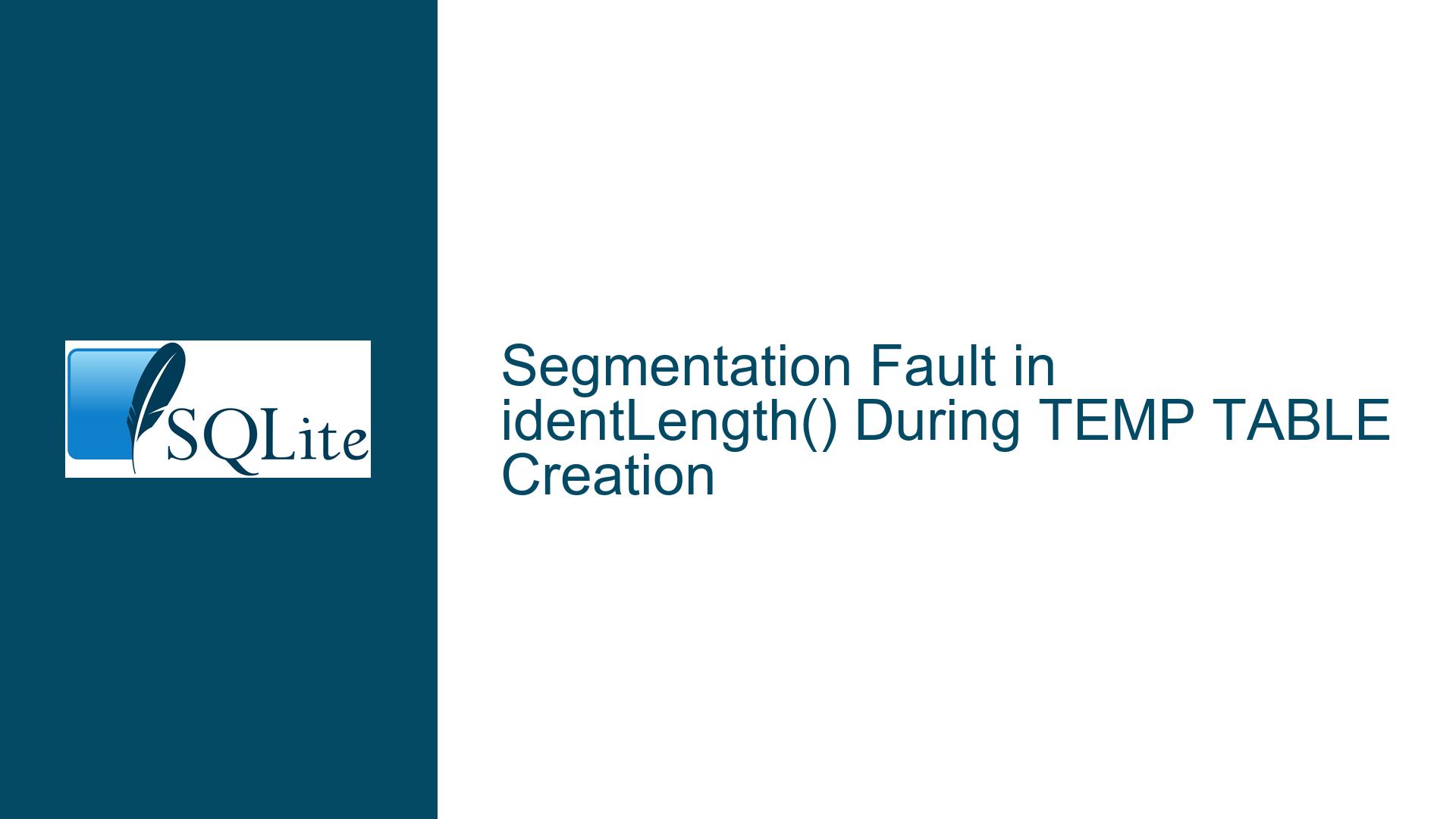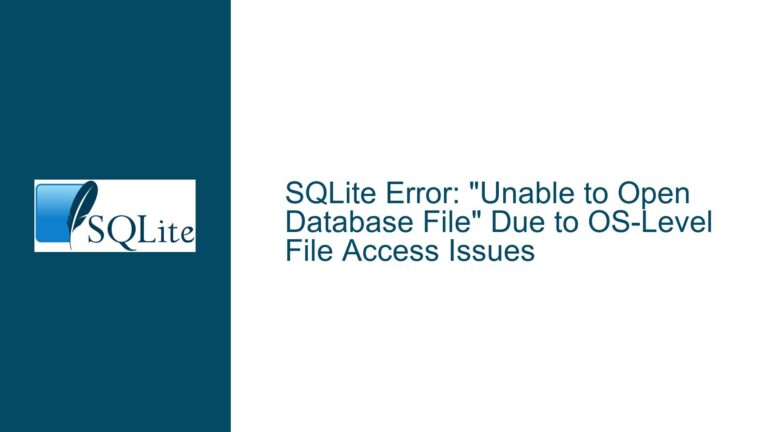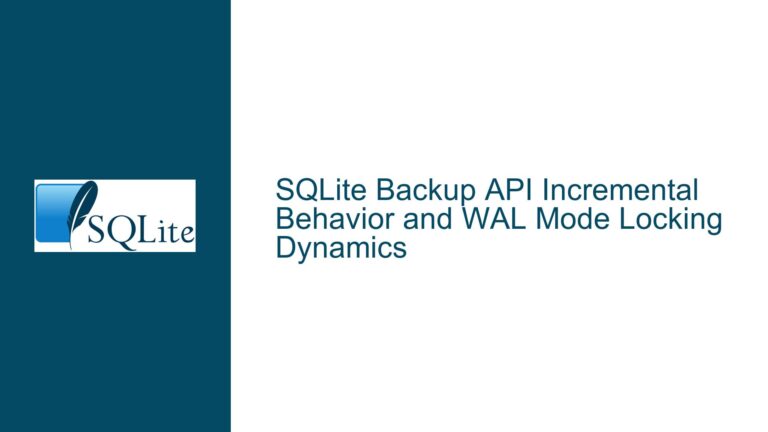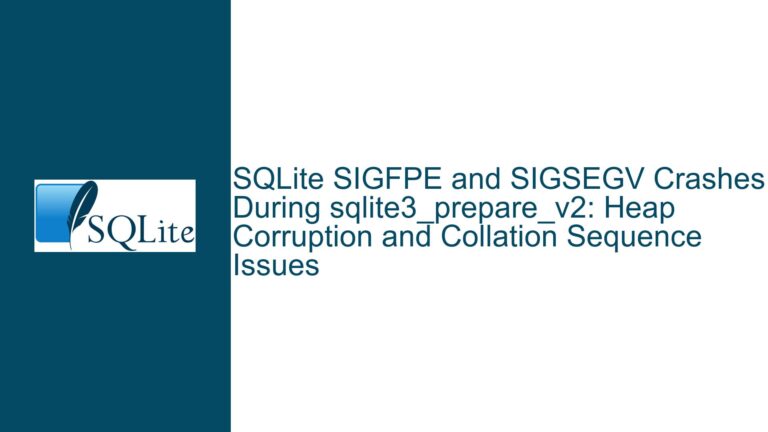Segmentation Fault in identLength() During TEMP TABLE Creation
Segmentation Fault in identLength() During TEMP TABLE AS SELECT Execution
Root Cause Analysis of SQLite SIGSEGV During CREATE TEMP TABLE Parsing
Crash Context and Technical Breakdown
The SIGSEGV (segmentation fault) occurs at memory address 0x0 during execution of the identLength() function, which is part of SQLite’s internal identifier validation logic. This crash manifests specifically when parsing a CREATE TEMP TABLE IF NOT EXISTS ... AS SELECT statement that includes parameterized values ($EventMask1, $Type1, etc.). The stack trace indicates the parser calls identLength() with a null pointer (z=0x0), implying an attempt to compute the length of a non-existent identifier. Key components involved include the SQLite parser state machine (sqlite3Parser), the table creation logic (sqlite3EndTable), and the prepared statement API (sqlite3Prepare). The crash originates from the absence of proper validation for identifier tokens before their length calculation.
Potential Triggers for Null Pointer Dereference in Identifier Handling
The null pointer dereference in identLength() suggests a missing or malformed identifier token during SQL parsing. One likely scenario is improper handling of parameterized values ($EventMask1) when generating the temporary table schema. SQLite treats these parameters as host parameters bound at runtime, but their presence in DDL (Data Definition Language) statements like CREATE TABLE ... AS SELECT may violate parsing expectations. Another possibility is schema corruption where metadata about existing tables (e.g., FileInfo) contains invalid entries, causing the parser to dereference uninitialized memory. Memory management flaws in the application layer—such as premature destruction of database connections or statement objects—could also corrupt the parser’s internal state. Version-specific bugs in SQLite’s handling of TEMP TABLE creation with embedded parameters might contribute, especially if using non-standard compilation flags or outdated library versions.
Comprehensive Diagnosis and Resolution Strategies
Validate SQLite Version and Build Configuration
ExecuteSELECT sqlite_version();to confirm the SQLite version. Versions prior to 3.44.0 (2023-11-01) lack fixes for edge cases inCREATE TABLE AS SELECTparsing. Rebuild SQLite with debugging symbols usingCFLAGS="-g" ./configureto enable detailed stack traces. Verify compilation flags for anomalies likeSQLITE_OMIT_AUTOINITorSQLITE_OMIT_SHARED_CACHE, which might destabilize the parser.Audit SQL Syntax for Parameter Misuse
TheCREATE TEMP TABLE ... AS SELECTstatement includes parameters ($EventMask1) in the WHERE clause. While parameters are valid in DML (Data Manipulation Language), their use in DDL requires careful scoping. Rewrite the query using static values for testing:CREATE TEMP TABLE TempQueryCache_1880 AS SELECT * FROM FileInfo WHERE EventMask > 123 AND Type = 456 AND (Sync=1 OR Sync=2);If the crash resolves, the issue lies in parameter binding during DDL execution. SQLite does not support late-binding parameters in schema-modifying statements—parameters must be bound before preparing the statement. Use
sqlite3_prepare_v3()withSQLITE_PREPARE_PERSISTENTto ensure parameter metadata is retained.Inspect Schema Integrity and Object Names
Corrupted schema entries forFileInfoorTempQueryCache_1880might cause parser confusion. Run:PRAGMA quick_check;to detect schema corruption. Validate that
FileInfohas a consistent structure across all database connections. Temporary tables exist in a separatetempschema, so ensure no naming collisions between persistent and temporary objects.Enable SQLite Debugging Features
SetPRAGMA parser_trace=1;before executing the query to log parser state transitions. Look for unexpected tokenization of$EventMask1as an identifier instead of a parameter. Enable memory debugging with:export SQLITE_DEBUG=1to track memory allocation/deallocation patterns around the crash site.
Analyze Core Dumps with GDB
Load the core dump in GDB and inspect the parser’s state at the crash moment:(gdb) frame 0 #0 identLength (z=0x0) at sqlite3.c:117234 (gdb) print yypParser->svalThe
svalfield in the parser stack (yypParser) should contain the current token. Ifsval.zis null, it indicates a missing token population during grammar reduction.Test with Alternative SQLite Builds
Download the latest SQLite amalgamation from https://sqlite.org/download.html and recompile the application against it. If the crash persists, usegit bisecton SQLite’s source repository to identify the commit that introduced the regression. Focus on changes toparse.y(the parser generator input) andbuild.c(table creation logic).Review Application-Side Memory Management
Ensure the database connection handle (db=0x70d6443f00) remains valid throughout the statement’s lifecycle. Use-after-free errors can corrupt the parser’s context. Instrument the application with AddressSanitizer or Valgrind to detect memory violations:valgrind --tool=memcheck ./your_applicationParameter Binding Protocol Verification
SQL parameters in DDL require binding before preparation. Modify the code to:sqlite3_stmt *pStmt; rc = sqlite3_prepare_v2(db, sql, -1, &pStmt, NULL); if (rc == SQLITE_OK) { sqlite3_bind_int(pStmt, 1, EventMask1); // Bind other parameters... rc = sqlite3_step(pStmt); }Binding after preparation is insufficient for DDL parsing; parameters must be resolved during the parse phase.
Schema Locking and Concurrency Checks
If the application uses multiple threads or connections, ensure proper locking around theCREATE TEMP TABLEoperation. Temporary tables are connection-specific, but race conditions during schema updates can destabilize the parser. UseSQLITE_OPEN_FULLMUTEXmode to serialize access.Fallback to Static SQL Statements
If parameterized DDL proves unavoidable, preprocess the SQL query by substituting parameters before passing it tosqlite3_prepare_v2(). Usesnprintf()or parameter substitution libraries to generate static SQL, ensuring all identifiers are fully resolved before parsing.
This methodology addresses the null pointer dereference in identLength() through systematic validation of SQL syntax, memory states, and version compatibility, while providing workarounds for parameter handling in schema operations.






